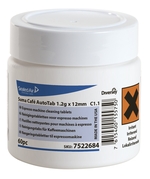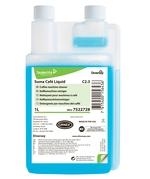Issue Date: 9 July 2014
Ref: DIV14/19
Cleaner Coffee Machines Build Bigger Profits
Coffee has been the catering success story of the decade. The number of businesses – including contract caterers and food service contractors – selling fresh coffee has grown significantly and we now drink more than eight billion cups of coffee away from home in the UK each year. Commercially, coffee offers good profit margins and creates opportunities to sell complementary products such as snacks. Despite the success things could be even better - many outlets could reduce running costs and generate bigger profits simply by cleaning their coffee machines more often.
The first reason to clean a coffee machine is improved quality and taste. The essential oils that help give coffee its distinctive flavour are released during roasting and the brewing process. Left alone they form residues inside the machine which impart bitterness to the drink.
Even very small amounts of residue can affect the taste of the coffee which is why leading professional baristas insist on cleaning their busiest machines two or three times a day. In most commercial situations a machine should be cleaned at least daily. Anecdotal evidence suggests that the majority of establishments only clean their machines weekly or even less frequently. Under these circumstances many coffee drinkers will never get to enjoy the proper flavour.
Cleaning the machine more often should have significant implications for anyone selling coffee. Better tasting coffee will enhance the reputation of the outlet and lead to repeat business and the good reviews and recommendations that attract new customers. Happy customers who stay longer or visit more often are likely to buy more coffee and other profitable products.
The second major reason for cleaning a coffee machine is reliability. The same oily deposits that affect the taste of the coffee will eventually block the tubes and filters inside the machine. In hard water areas lime scale can accumulate and add to the problem. Blockages slow the machine down which affects efficiency but the bigger problems are damage to components and malfunctions.
Outages always lead to lost revenues because customers cannot buy what they want. An even more pressing issue for many businesses is the cost of putting things right.
One national retailer with on-site food service outlets found that 60 per cent of its coffee machine problems were related to poor cleaning. Daily cleaning with the right products reduced the number of outages significantly and saved over £80000 a year in service and maintenance costs. All for the sake of a few minutes and a few pence spent on daily cleaning.
These issues apply to all common types of coffee making equipment including traditional and automatic espresso, drip filter or vacuum flask, fresh-brew or bean-to-cup vending machines. Even grinders can be affected by residues.
Time and cost is often given as the reason why machines are not cleaned. Of the total cost of an average cup of coffee, around 25 per cent goes on staff wages, 30 per cent on overheads such as rent and admin, and 15 per cent on ingredients and packaging. VAT and profit account for the remainder.
By comparison, products from Diversey Care’s new Suma Cafe range cost just a few pence per day for cleaning each machine. The range includes simple, effective and sustainable products suitable for every common type of coffee machine. In a typical outlet which sells 200 cups of coffee at £2.20 each day the profit from selling just one extra cup would pay for these products.
This small investment makes a real difference in coffee quality and machine performance which leads to the enhanced customer perceptions and behaviour that help to maximise profits and reduce maintenance costs.




